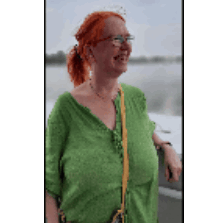
Greetings to all my blog readers. There was a time when I had two identities for a while: Linda Turner and Linda Turnerová. How did this come about? It was because I obtained my Czech citizenship on 25 November 2021 and it is the norm to add the suffix ‘-ová’ to female names in the Czech Republic and Slovakia. (Other nations with Slavic languages have variations of this suffix.) While I was aware of this, I knew that it was also possible to opt out, although the amendment to the Czech Registry Act allowing all women to do so did not go into effect until January 2022. Prior to this, women were only permitted to drop the ‘–ová’ if they were:
- foreign citizens,
- had a foreign nationality,
- lived with a foreigner, or
- had temporary residence in a foreign country.
This change in legislation was seen by some as a step forward for women’s rights, while others saw it as an affront to the Czech language since ‘-ová’ denotes a feminine ending and removing this can cause confusion. For instance, one of my students once told me that when they saw the name ‘Turner’ on the timetable before they met me, they presumed I was a man.
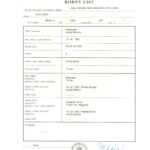 What I was not aware of was that the process entailed an automatic name change to the default setting with the suffix ‘-ová’ and then reverting back once I received my Czech birth certificate. This was not a translation into Czech of my original birth certificate, although I did have to provide a notarized copy of this during the citizenship application process. Fortunately, I only had to have it notarized and not apostilled because it was before Brexit was ‘done’. This was submitted along with a long list of other documents: certificates for the language test (B1 level according to the Common European Framework of Reference for Languages, CERF) and realie test (about Czech life and institutions, also including geographical, historical and cultural information about the country), a životopis (a long bio including reasons for applying for citizenship and examples of integration into Czech society), tax declarations for the past three years, health insurance history to prove I was living here, my rent contract, a list of trips abroad during the last ten years, and proof of no debts to the Czech government (tax, health insurance, social security and customs). The Czech birth certificate with a Czech rodné číslo or birth number, similar to a national insurance number in the UK, is issued in Brno for the whole country and can take two to three months to receive by post.
What I was not aware of was that the process entailed an automatic name change to the default setting with the suffix ‘-ová’ and then reverting back once I received my Czech birth certificate. This was not a translation into Czech of my original birth certificate, although I did have to provide a notarized copy of this during the citizenship application process. Fortunately, I only had to have it notarized and not apostilled because it was before Brexit was ‘done’. This was submitted along with a long list of other documents: certificates for the language test (B1 level according to the Common European Framework of Reference for Languages, CERF) and realie test (about Czech life and institutions, also including geographical, historical and cultural information about the country), a životopis (a long bio including reasons for applying for citizenship and examples of integration into Czech society), tax declarations for the past three years, health insurance history to prove I was living here, my rent contract, a list of trips abroad during the last ten years, and proof of no debts to the Czech government (tax, health insurance, social security and customs). The Czech birth certificate with a Czech rodné číslo or birth number, similar to a national insurance number in the UK, is issued in Brno for the whole country and can take two to three months to receive by post.
I chose to opt out of the ‘-ová’ suffix for three reasons. First, Linda Jayne Turner is the company name on my website, email address and business cards, the brand all my clients and colleagues associate with my work. Second, I wanted to avoid potential problems arising from having a different name on my UK passport and other official documents. Third, the name Turnerová (aka Turn ‘er over) caused much merriment to my English-speaking friends and colleagues. (I decided to keep it as my nickname on Facebook.)
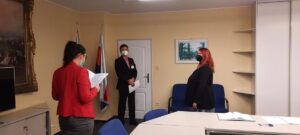
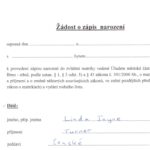 Following my slib (oath sworn at my citizenship ceremony), I applied to opt out of the Turnerová name change, or rather to revert to my original name Turner. I filled in the relevant form and one of the nice ladies at the matrika (registry office) in Prague 10 sent it off to Brno. I wasn’t allowed to apply for my permanent Czech ID card until I got the Czech birth certificate, but I could get a temporary one in the interim. I could already apply for my Czech passport at this stage but only with the name Turnerová and if I wanted one with Turner, I would have to apply – again – and pay – again – later. As I didn’t have any plans to travel internationally over the next few months and I still had a valid UK passport for what it’s worth (which is less than it was), I decided to wait.
Following my slib (oath sworn at my citizenship ceremony), I applied to opt out of the Turnerová name change, or rather to revert to my original name Turner. I filled in the relevant form and one of the nice ladies at the matrika (registry office) in Prague 10 sent it off to Brno. I wasn’t allowed to apply for my permanent Czech ID card until I got the Czech birth certificate, but I could get a temporary one in the interim. I could already apply for my Czech passport at this stage but only with the name Turnerová and if I wanted one with Turner, I would have to apply – again – and pay – again – later. As I didn’t have any plans to travel internationally over the next few months and I still had a valid UK passport for what it’s worth (which is less than it was), I decided to wait.
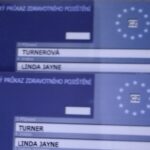 In the meantime, I had to get a replacement health insurance card after having that stolen. When I called my provider, OZP, I was told they had already sent me a new one. I was puzzled because I hadn’t applied for one (or received it) but then I discovered it was because they had automatically sent me a new card with my new name, yes, Turnerová. I also lost my newly obtained temporary Czech ID when I was robbed, and it turned out there is no system in place to replace it, meaning that I just had to wait for the permanent ID. With the aid of Petr Sezemský who did an excellent job helping me with my citizenship application, I managed to at least get a document confirming this. It took about five weeks to get my birth certificate from Brno, which was much faster than expected, especially since this was over the Christmas period.
In the meantime, I had to get a replacement health insurance card after having that stolen. When I called my provider, OZP, I was told they had already sent me a new one. I was puzzled because I hadn’t applied for one (or received it) but then I discovered it was because they had automatically sent me a new card with my new name, yes, Turnerová. I also lost my newly obtained temporary Czech ID when I was robbed, and it turned out there is no system in place to replace it, meaning that I just had to wait for the permanent ID. With the aid of Petr Sezemský who did an excellent job helping me with my citizenship application, I managed to at least get a document confirming this. It took about five weeks to get my birth certificate from Brno, which was much faster than expected, especially since this was over the Christmas period.
However, the saga was not quite over yet because there was a typo in my new birth certificate. My mum’s place of birth, Featherstone, had been spelt ‘Featherstore’. Unfortunately, the nice lady at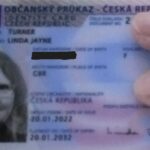 the matrika dealing with this (most of them are nice!) was off sick with Covid. Her colleague who was covering for her was most disgruntled about being disturbed with a request to help a client. After rudely kicking us out of her office, she reluctantly went to retrieve the relevant paperwork from her colleague’s office and brought it to us where were waiting out in the corridor. She pointed to the name of the town and triumphantly exclaimed (in Czech, of course): “If that’s an ‘n’, I’m the Queen of England.” It was an ‘n’ and she wasn’t the Queen of England. She was too young and far too unprofessional. Ultimately, the typo was corrected. The nice lady sorted it out with the people in Brno once she returned to work.
the matrika dealing with this (most of them are nice!) was off sick with Covid. Her colleague who was covering for her was most disgruntled about being disturbed with a request to help a client. After rudely kicking us out of her office, she reluctantly went to retrieve the relevant paperwork from her colleague’s office and brought it to us where were waiting out in the corridor. She pointed to the name of the town and triumphantly exclaimed (in Czech, of course): “If that’s an ‘n’, I’m the Queen of England.” It was an ‘n’ and she wasn’t the Queen of England. She was too young and far too unprofessional. Ultimately, the typo was corrected. The nice lady sorted it out with the people in Brno once she returned to work.
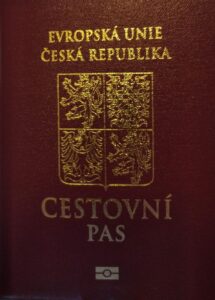
Shortly after that encounter, I got my permanent Czech ID (valid for ten years but a matter of routine to renew it) and, a few days later, my Czech passport. I was ecstatic to finally have this in my hand. For one thing, I was really pleased to be able to vote in the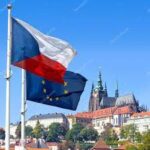 last presidential elections after being disenfranchised for so long. It surprises many people when I tell them I’m no longer allowed to vote in the UK, including in referendums, despite still being a British citizen, since I’ve been living abroad for more than fifteen years.* And, for another thing, I am absolutely delighted to be able to travel within the European Union as an EU citizen once more.
last presidential elections after being disenfranchised for so long. It surprises many people when I tell them I’m no longer allowed to vote in the UK, including in referendums, despite still being a British citizen, since I’ve been living abroad for more than fifteen years.* And, for another thing, I am absolutely delighted to be able to travel within the European Union as an EU citizen once more.
* Update: The law on this was changed as of January 2024 so I was able to vote in the UK general election in July of that year.
Photo at top of blog post by Annette Willems. Post edited by Robin Finesilver.
